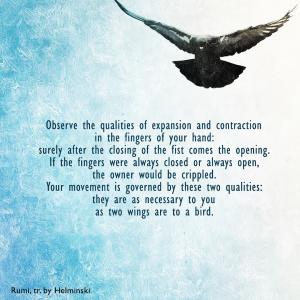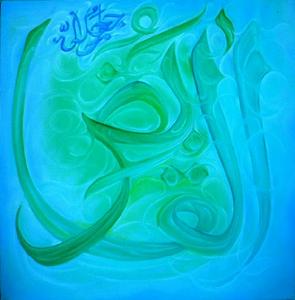Through the tears welling up in my eyes, I looked down at the opening and closing of my hand.
First I wrapped my four right fingers over my thumb and pressed them against the centre of my palm into a fist. I examined it for several seconds, then slowly released the fist until my fingers were outstretched. For a few moments more, I gazed at my open hand, before closing it again.
After several minutes I started to sync the motions with my breath so I inhaled as the fist closed, and exhaled as it opened. With every in breath I silently repeated Ya Qabid (The One Who Constricts), one of the 99 Qualities of Allah, understood as the Divine Reality in the Islamic Sufi tradition.
With each out breath, Ya Basit (The One Who Expands Our Hearts), emerged in a whisper from my lips.
I concentrated on this meditation long after the sobbing had ceased, mesmerized by the incredible workings of the human body. Rumi's poetry frequently references the harmony between expansion and contraction. In a physical sense, it keeps us alive: the rise and fall of our diaphragms brings forth breath and the heart constricts and expands to move blood through our veins.
And yet, when it comes to emotions, how often in life have I clung to joy and sought to prolong it, and deemed pain as "bad" and sought to keep my sojourn in grief and sorrow as brief as possible. In my meditation, a more visceral understanding of the importance of accepting the difficulty and ease of life with equal graciousness settled into my heart.
Rumi alludes to this in the verse Two Wings:
The beauty of some, like Ya Karim (The Most Generous One) or Ya Wadud (The Infinitely Loving One) is easy to grasp. Others like Ya Qabid and Ya Basit, are trickier because they express the fluctuation between opposites. Along with pairs like The Abaser (Al-Khafid) and the Exalter (Ar-Rafi) or The Bestower of Honour (Al-Muizz) and The One Who Humbles (Al-Mudhill), they remind us that Divinity encompasses all human states, pretty and ugly alike.

At first, this realization shook me. I’d spent a long time unconsciously leaning on spiritual practice to avoid facing and healing unresolved emotional pain and psychological wounding, falling into the dreaded traps of spiritual bypassing. Hiding behind a veneer of positivity was easier for me than peeking at the difficult emotions dwelling just beyond the thin veil I pretended wasn’t there.
My relationship with suffering has changed with the understanding that in order to live my highest truth, I need to dive into the wounding that separated me from innermost heart in the first place. That’s meant engaging with some raw pain that’s been with me since I was a little girl who didn't feel worthy of unconditional love. She’s the part of me that tends to seek perfection because she believes without it she won’t be loved. Fearful of being rejected if she expresses her voice, she chooses silence over authenticity.
Admitting these and other truths, let alone allowing myself to feel them, has been challenging. But only when the torment of these wounds is felt deeply and held lovingly can the spiritual healing offered by Sufism genuinely unfold.
Reading Rumi, we often come across the imagery of humans being akin to diamonds or rubies at our core, that is, our highest potentiality. Mining these valuable gems from the Earth requires drilling through layers of hard rock that settled over centuries and, frankly, are impossible to move without heavy machinery. Similarly, the inward spiritual journey demands burrowing through the embedded beliefs forced onto my psyche by family, religion and society that are blocking the radiance of my truest self.
So, like a miner, I drill. It’s painful and yet I instinctively know that even in the depths of agony, I’m not alone. I’m aware of the Divine Quality Ya Rahman, the Infinitely Compassionate One, holding the pain with me. The Arabic word Rahman derives from the same root as the word womb. When I learned this a couple of years ago, I began to conceive of God as a Loving Womb connected to all of creation with an invisible umbilical cord, holding each of us in all of our states.
Feeling attached to Ya Rahman at my core has given me the courage to be vulnerable enough to sink into the mine shaft of my psyche. Surrendering to Ya Qabid, I know I’m being guided through my wounding to the ruby nature that lies beneath, so I’m less distracted or irritated by the anguish of the journey. Rather, the pain I feel and the tears I shed have a strange sweetness to them now. The Quranic promise, with every difficulty comes ease**, rings in my ears.
Each time I emerge from a wound, the immense ease of Ya Basit fills my chest and torso. My Truth comes into view more clearly and vividly, as though dust has been brushed away from the surface of my mind’s eye. More than ever, I can savor the periods of expansion with gratitude. And when sorrow returns, I'm getting better at patiently wading through the contraction to listen to the lessons it contains, gently guided by Mevlana’s words:
First I wrapped my four right fingers over my thumb and pressed them against the centre of my palm into a fist. I examined it for several seconds, then slowly released the fist until my fingers were outstretched. For a few moments more, I gazed at my open hand, before closing it again.
After several minutes I started to sync the motions with my breath so I inhaled as the fist closed, and exhaled as it opened. With every in breath I silently repeated Ya Qabid (The One Who Constricts), one of the 99 Qualities of Allah, understood as the Divine Reality in the Islamic Sufi tradition.
With each out breath, Ya Basit (The One Who Expands Our Hearts), emerged in a whisper from my lips.
 |
| Ya Qabid, The Constrictor |
And yet, when it comes to emotions, how often in life have I clung to joy and sought to prolong it, and deemed pain as "bad" and sought to keep my sojourn in grief and sorrow as brief as possible. In my meditation, a more visceral understanding of the importance of accepting the difficulty and ease of life with equal graciousness settled into my heart.
Rumi alludes to this in the verse Two Wings:
Working with Divine Names like Ya Qabid and Ya Basit has been transformative for my spiritual practice this year as I engage with some old psychological wounds that had been buried in the depths of my subconscious. In the Sufi tradition, we understand the Names as Qualities of Reality which we can activate in ourselves by consciously holding them and allowing their essence to unfold within us.Observe the qualities of expansion and contractionIn the fingers of your handSurely after the closing of your fist comes the opening.If the fingers were always closed or always open,the owner would be crippled.Your movement is governed by these two qualities:They are as necessary to you as two wings are to a bird.(Mathnawi III, 3762-66)*
The beauty of some, like Ya Karim (The Most Generous One) or Ya Wadud (The Infinitely Loving One) is easy to grasp. Others like Ya Qabid and Ya Basit, are trickier because they express the fluctuation between opposites. Along with pairs like The Abaser (Al-Khafid) and the Exalter (Ar-Rafi) or The Bestower of Honour (Al-Muizz) and The One Who Humbles (Al-Mudhill), they remind us that Divinity encompasses all human states, pretty and ugly alike.

At first, this realization shook me. I’d spent a long time unconsciously leaning on spiritual practice to avoid facing and healing unresolved emotional pain and psychological wounding, falling into the dreaded traps of spiritual bypassing. Hiding behind a veneer of positivity was easier for me than peeking at the difficult emotions dwelling just beyond the thin veil I pretended wasn’t there.
My relationship with suffering has changed with the understanding that in order to live my highest truth, I need to dive into the wounding that separated me from innermost heart in the first place. That’s meant engaging with some raw pain that’s been with me since I was a little girl who didn't feel worthy of unconditional love. She’s the part of me that tends to seek perfection because she believes without it she won’t be loved. Fearful of being rejected if she expresses her voice, she chooses silence over authenticity.
Admitting these and other truths, let alone allowing myself to feel them, has been challenging. But only when the torment of these wounds is felt deeply and held lovingly can the spiritual healing offered by Sufism genuinely unfold.
Reading Rumi, we often come across the imagery of humans being akin to diamonds or rubies at our core, that is, our highest potentiality. Mining these valuable gems from the Earth requires drilling through layers of hard rock that settled over centuries and, frankly, are impossible to move without heavy machinery. Similarly, the inward spiritual journey demands burrowing through the embedded beliefs forced onto my psyche by family, religion and society that are blocking the radiance of my truest self.
So, like a miner, I drill. It’s painful and yet I instinctively know that even in the depths of agony, I’m not alone. I’m aware of the Divine Quality Ya Rahman, the Infinitely Compassionate One, holding the pain with me. The Arabic word Rahman derives from the same root as the word womb. When I learned this a couple of years ago, I began to conceive of God as a Loving Womb connected to all of creation with an invisible umbilical cord, holding each of us in all of our states.
Feeling attached to Ya Rahman at my core has given me the courage to be vulnerable enough to sink into the mine shaft of my psyche. Surrendering to Ya Qabid, I know I’m being guided through my wounding to the ruby nature that lies beneath, so I’m less distracted or irritated by the anguish of the journey. Rather, the pain I feel and the tears I shed have a strange sweetness to them now. The Quranic promise, with every difficulty comes ease**, rings in my ears.
Each time I emerge from a wound, the immense ease of Ya Basit fills my chest and torso. My Truth comes into view more clearly and vividly, as though dust has been brushed away from the surface of my mind’s eye. More than ever, I can savor the periods of expansion with gratitude. And when sorrow returns, I'm getting better at patiently wading through the contraction to listen to the lessons it contains, gently guided by Mevlana’s words:
When a feeling of spiritual contraction comes over you,O traveler, it's for your own good.Don't burn with grief,for in the state of expansion and delight you are spending.That enthusiasm requires an income of pain to balance it.If it were always summer,the sun's blazing heat would burn the gardento the roots and depths of the soil.The withered plants never again would become fresh.If December is sour-faced, yet it is kind.Summer is laughing, but yet it destroys.When spiritual contraction comes,behold expansion within it;be cheerful and let your face relax.(Mathnawi III, 3734-3739)** From Jewels of Remembrance, translated by Camille and Kabir Helminski** Quran, Surah Al-Inshirah (The Expansion), 94, 5-6
No comments:
Post a Comment